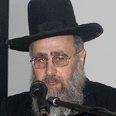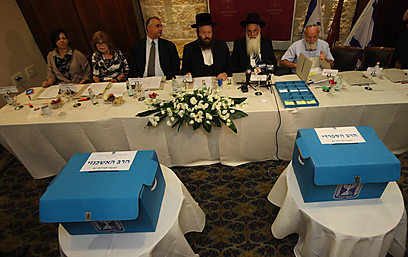
David Lau, Yitzhak Yosef named chief rabbis
Following long and heated race, sons of former chief rabbis elected to replace Yona Metzger and Shlomo Amar as Israel's Ashkenazi and Sephardic religious leaders for next 10 years. Deri: Rabbinate is no place for political battles
New era in Chief Rabbinate: Rabbi Yitzhak Yosef and Rabbi David Lau have were elected Wednesday evening as Israel's next Sephardic and Ashkenazi chief rabbis, respectively. Rabbis David Stav and Shmuel Eliyahu made it to the second place.
The announcement was made by the chairman of the board electing the chief rabbis and Deputy Ministry for Religious Affairs Eli Ben-Dahan after the votes of 147 board members were counted.
The new chief rabbis will replace Sephardic Chief Rabbi Shlomo Amar and Ashkenazi Chief Rabbi Yona Metzger, and will hold their new posts for the next 10 years.
Lau is the son of former Ashkenazi Chief Rabbi and Tel Aviv's Chie Rabbi Israel Meir Lau, and Yosef is the son of former Sephardic Chief Rabbi and Shas spiritual leader Ovadia Yosef.

Moment before vote (Photo: Gil Yohanan)
The elections followed a long and heated race. Six candidate made it to the final stage: Rabbis Lau, Stav and Yaakov Shapira, who competed for the title of Ashkenazi chief rabbi, and Rabbis Yosef, Eliyahu and Zion Boaron, who run for the position of Sephardic chief rabbi.
Bennett: Significant changes needed in Rabbinate
Officials from the Habayit Hayehudi party said that despite the loss of the candidates affiliated with religious-Zionism to the haredi rabbis, party leader Naftali Bennett is more determined than ever to implement reforms in Israel's religious services.
"Bennett is the minister for religious affairs, and in the very near future he will promote a long line of significant reforms in kashrut, marriage, the consolidation of the position to one chief rabbi and more," a party member said.
Bennett himself said, "The election campaign highlighted the need for significant changes in the Rabbinate."
Bennett and his party leaned toward Rabbi David Stav, founder of the Tzohar movement. Rabbi Stav came in second in the race for Ashkenazi chief rabbi. "The revolution has already begun," Bennett said, citing what he saw as changes in the way religious councils are formulated.
Shas Chairman Aryeh Deri told Ynet that "from now on there is no Shas and no Habayit Hayehudi. The Rabbinate is no place for political battles – that is what the Knesset is for."
Regarding the rivalry with Habayit Hayehudi, Deri said: "Unfortunately political strife still exists between us. There was a hard battle in which ministers and MKs took part, but that is all behind us now. I offered them to go for a compromise months ago, but they chose to go another way."
Protests against Rabbi Eliyahu
Voting began at 3 pm, with Jerusalem Mayor Nir Barkat and Tel Aviv Mayor Ron Huldai among the first to vote.
"I am in favor of a Zionist rabbi for the State of Israel," said Barkat, referring to candidates David Stav and Shmuel Eliyahu. He added that he wished success to anyone elected. "We will embrace him and work together," he said.
Huldai used the opportunity to call for an annulment of the double role and for the election of just one chief rabbi, either Ashkenazi or Sephardic.
During the voting, dozens of activists of the Tag Meir movement held a protest outside against Rabbi Shmuel Eliyahu over his controversial statements against Arabs, which led Attorney General Yehuda Weinstein to declare that he was "unsuitable" for the position of chief rabbi.
Rabbi Israel Meir Lau said the protests provide that the public was interested in the Rabbinate and that it was still relevant for the State of Israel.










